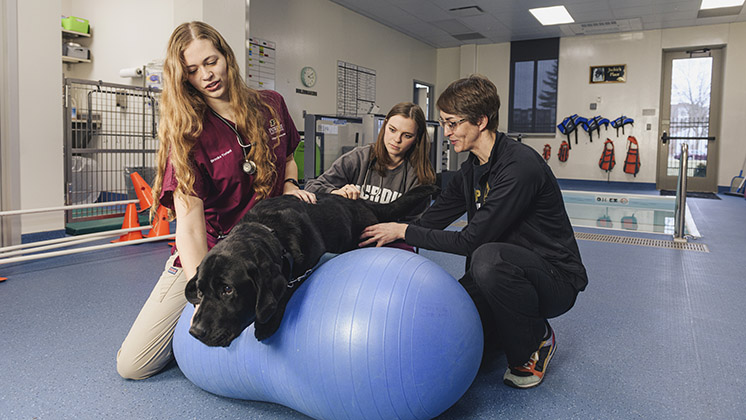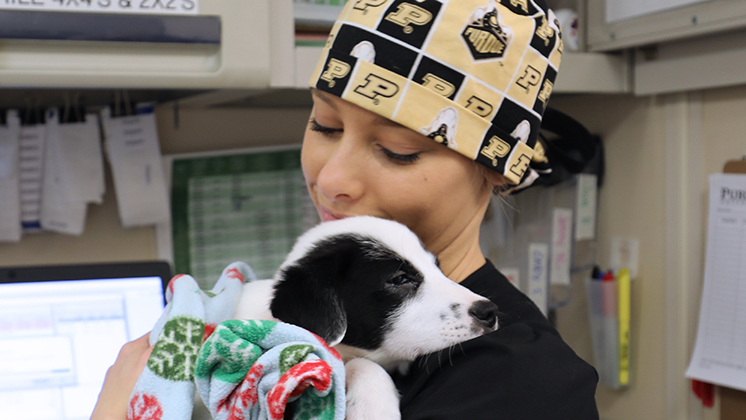
by Paige Allen, MS, RVT and Josh L. Clark, MS, RVT
Choosing a career in the veterinary field often comes down to personal preferences, career goals, financial considerations, and lifestyle. While becoming a veterinarian might seem like the obvious choice for people who love animals, it is important to recognize that you also need to love science, math, and people. There has yet to be a veterinary patient who has driven themselves to their appointment. Communication and people skills are also highly desirable in veterinary medicine. Being a DVM is not the only career in veterinary medicine, there are numerous reasons why one might decide to become a veterinary technician (vet tech) instead. Here are a few factors to consider.
Both educational pathways require a significant commitment to education. For the DVM, you start in an undergraduate program of your choice that will help you complete the prerequisite courses needed to apply to vet school. Typical majors are in animal science, biology, or any other major of your choosing. Once you have completed the undergraduate prerequisite courses, you begin the application process for veterinary school, which typically takes four years to complete. After graduation from vet school, you may choose to further your education by specialization or an internship, depending on your interests.
Learn more about becoming a DVM at Purdue
In contrast, vet techs usually earn an associate's or bachelor’s degree in veterinary technology or veterinary nursing. This educational pathway means you can start your career faster as a vet tech compared to a veterinarian. Vet techs take the same types of classes as DVM students. For example, you both study anatomy, physiology, and pharmacology, but the content is specific to how you view and interact with your patient. While the vet students learn how to diagnose disease in a patient, the vet tech student learns what it means to care for a patient with that disease.
Learn more about becoming a Vet Nurse at Purdue
The cost of both educational pathways is relative to what your salary may be when you graduate. Vets may make more money but their educational expenses are higher due to longer time in school. Vet techs spend less time in school but depending on their career pathway may make less. For example, if a vet tech works in a small one-doctor practice, they will make less than if they work in a large speciality practice or in a research setting.
While veterinarians do have direct contact with animals, much of their time can also be spent performing surgery, diagnosing illnesses, or prescribing medication. Vet techs often spend more time on direct animal care, including nursing care, conducting routine lab work, and assisting with exams and procedures. In addition, most vet techs are the primary contact for client education, questions, and support. If your primary interest is in hands-on care and comfort for animals and engaging with clients, you might find a vet tech role more fulfilling.
While both vets and vet techs play crucial roles in animal healthcare, the choice between these two paths depends on individual goals and circumstances. One way to help you decide is to spend time in a veterinary facility, talk to the vet and the vet tech. Observing both roles in real life may help you decide which path is right for you.
If you have more questions about Purdue’s educational opportunities for vets and vet techs, please contact us. We’d love to answer any questions you have and help you make the best career decision based on your goals.
Find your calling as a Purdue Veterinary Technician!
Not quite ready to apply? Connect with us to learn more.

Explore the comprehensive guide on how to become a Veterinary Technician (Vet Tech). Learn about the essential steps including educational requirements, credentialing, and gaining practical experience. Start your journey to this rewarding career in animal healthcare today!
Read more
Understand the diverse acronyms used to represent veterinary technicians, from LVT to CrVT. Uncover the nuances between these titles, their state-specific usage, and understand that while the acronyms vary, the dedication to animal care remains consistent across all credentialed vet techs.
Read more
Explore the physical and emotional challenges of being a vet tech, and discover effective strategies to manage and mitigate stress in this rewarding profession.
Read more